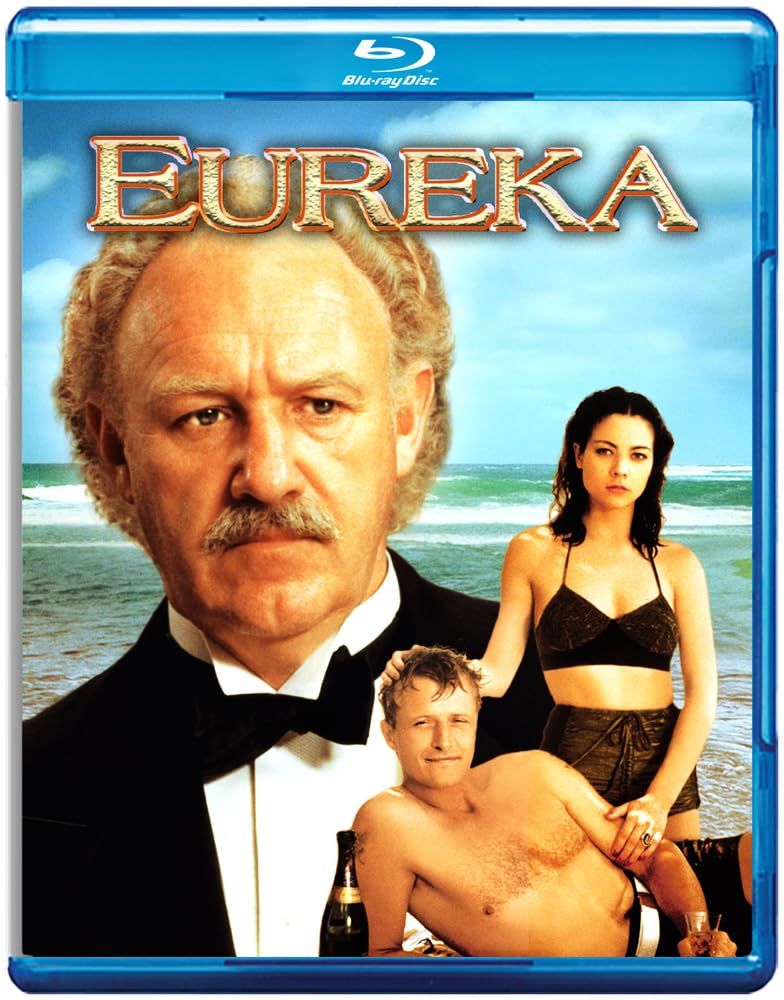
Eureka is four films in one, in succession. First, it’s an experimental art film about a man obsessed with finding gold. Then a family psychodrama about a father who hates his son-in-law and may want his daughter for himself. This becomes a horror movie, which begins with a voodoo orgy and ends with a home invasion and a graphic, gruesome murder. Finally, it’s a courtroom drama that becomes a filmed play.
Buy Eureka (1983) on Blu-rayThe center of these films is Jack McCann (Gene Hackman), who is singularly focused on gold. We’re introduced to him engaged in a brutal fistfight on a snowbank. Why is never clear. It seems the man wanted to partner up, and Jack took offense. “I never earned a nickel from another man’s sweat!” he shouts, over and over.
Jack is on his own. Forever. And what’s his is his. Eventually, after a near-death experience and the intervention (apparently) of a prostitute soothsayer, he finds his motherlode. He becomes the richest man on Earth from Alaskan gold.
Thirty years later, he’s got his own island in the Caribbean. He owns everything he sees. The only problem is everything else. His wife is a drunk. His daughter is with a Frenchman. And unbeknownst to him, his best friend is brokering a deal with a gangster to buy the island out from under him to build a casino.
This description is rather straightforward, but nothing in this film is. Nicholas Roeg, who directed Eureka, spent his entire career defying cinematic norms and narrative formalities. Much of the discernible plot comes from inference, in scenes that are mostly subtext. It is constantly defying the audience to garner meaning. It rarely directly tells you anything.
It’s far from the director’s most obscure film. Performance with Mick Jagger basically explodes its plot midway through. The Man Who Fell to Earth is famously obscure. Eureka has several segments that adhere close to more conventional narrative, while always coming at odd angles.
This might sound like a chore, but the incredible cast does a lot of work to keep the audience’s interest. Gene Hackman is at his intense best here. A confident Rutger Hauer plays Claude, the rakish son-in-law. The daughter is the luminous Theresa Russell, Nic Roeg’s wife at the time. Joe Pesci (in one of his least explosive performances) plays an ersatz Meyer Lanksy, with Mickey Rourke is his right-hand man. Every character has hidden complexities that are hinted at.
But the center of the film is Jack, and his monstrous self-centeredness. He found that gold, and believes it is the center of not just his, but everyone’s universe. Jack oscillates between tyrannical and dismissive, with an explosively violent temper. He thinks Claude, his bizarre, cabbalistic son-in-law has somehow bewitched his daughter.
What he doesn’t come to understand that she might be like him, obsessed with a single idol. His is gold, hers is Claude. Both idols prove themselves unworthy, but the worship continues.
Eureka is fascinating, but a tough film to love. There are towering figures at the center of its story, but not a lot of relatable humanity. It’s like a bizarrely epic small art film. Or, like I said in the intro, several films since the storytelling shifts through various strategies at various parts of the film. The opening sequences are elliptical, sometimes just metaphoric montage. The second sequence comes closer to a standard narrative, but still employs a loose feeling to the editing. Scenes are cut on mood rather than strict narrative sense. The “horror movie” section of the film is still deeply strange but weirdly feels the most conventional. And then the courtroom scenes begin as conventional as possible, until a turn changes it from a standard criminal trial into a family psychodrama in public.
Eureka was barely released in the States, where it was rated X for its violence. United Artists shelved it for a couple of years. It barely eked out a single percent of its budget in box office returns. It’s probably one of the stranger big studio pictures of the ’80s. This Blu-ray release does not look like it has had the benefit of any restoration. Some of the materials look to be in fine shape. Others have dirt and specs, and look adequate, but not spectacular. For the most part it looks fine.
Eureka is an interesting addition to the Nic Roeg filmography. The story outline sounds more conventional than most of the director’s output: man gets rich, loses what really matters. But the approach to the material is just as challenging and unconventional as his more obviously experimental films. It was work to watch this movie. Not a chore, which denotes unpleasantness, but I had to actively participate in making sense of what I was seeing. For fans of the director, it might be something of a hidden surprise. Others might find that despite the magnificent performances, especially by Hackman and Hauer (both monsters constantly threatened by their incipient humanity), it’s too much work. Also, Theresa Russell is naked in it a lot.
Eureka has been released by MGM. There are no extras on the disc.